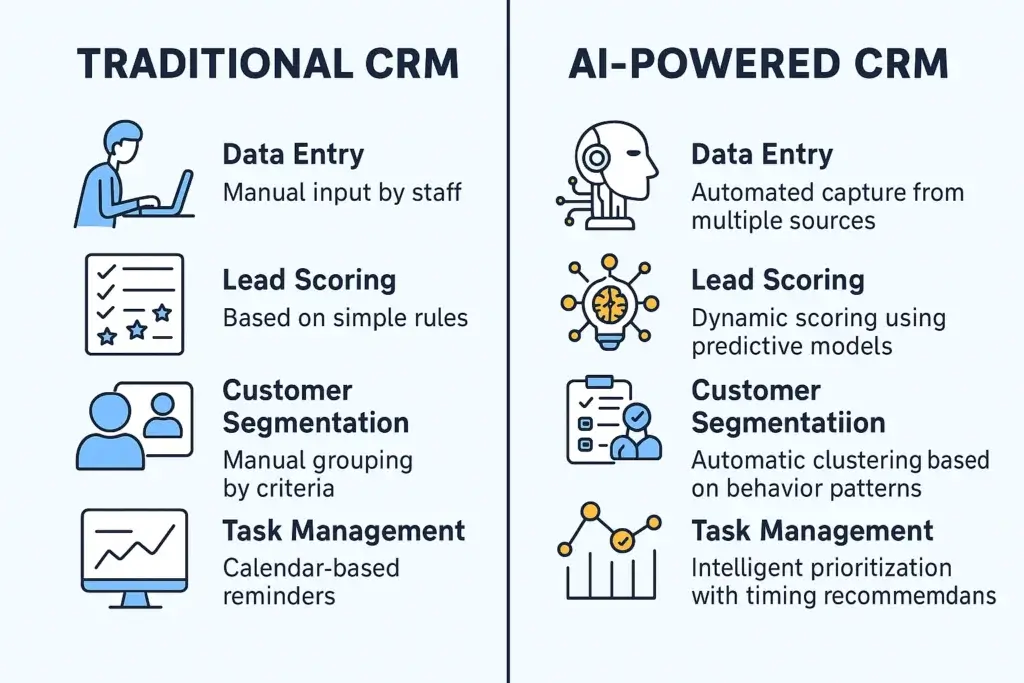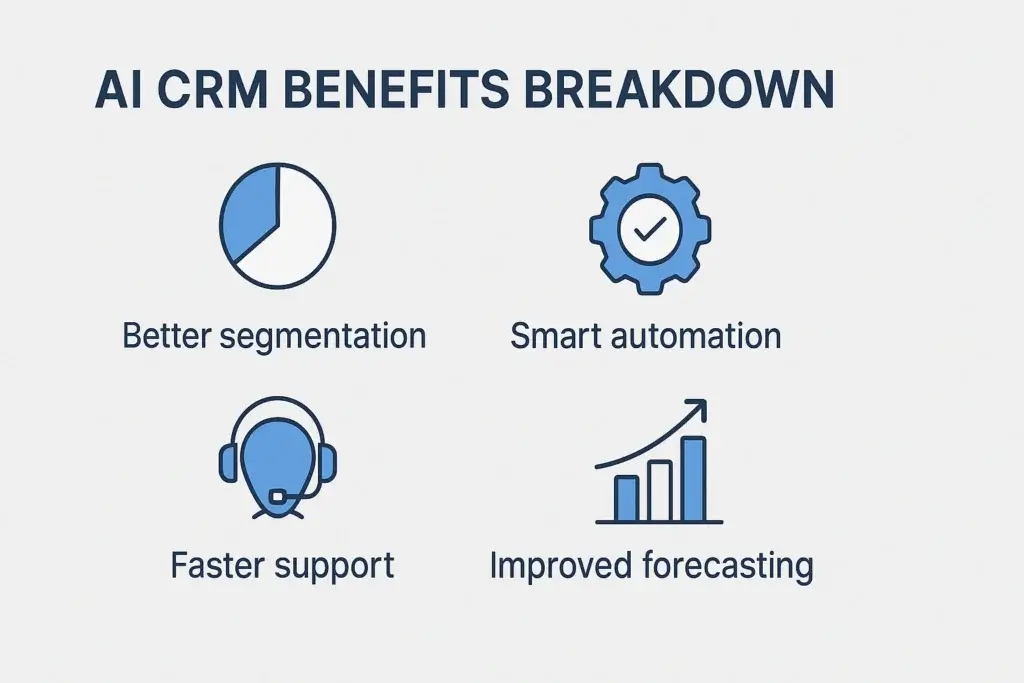
The search term “ai-powered crm” has grown fourfold over the past two years, showing a clear shift in customer relationship management approaches. This growing interest makes sense, as generative AI is poised to add $15.7 trillion to the global economy, changing how businesses work across industries.
The CRM market now includes nearly 700 vendors generating $88 billion in 2024, with AI CRM systems leading this growth. Yet sales teams show some of the lowest AI adoption rates at just 51%. This creates a major opportunity for companies wanting to grow without hiring more staff. When CRM and AI work together, businesses can automate routine tasks, improve reporting, and create personalized customer experiences, all while getting more from their current team members.
AI-driven lead scoring helps identify the prospects most likely to buy, directly improving your results. While 78% of executives say they have methods for scaling generative AI into customer experiences, 56% lack processes to review AI output and fix problems. This guide helps bridge that gap with practical strategies for implementing AI in CRM systems effectively, helping you double your sales without adding headcount in 2025.
What is an AI-Powered CRM and How Does It Work?
AI-powered CRM marks a shift from static databases to intelligent systems that predict customer behavior and automate processes. At its core, an AI-powered CRM blends traditional customer relationship management with artificial intelligence to improve decision-making, automate workflows, and deliver personalized experiences at scale.
Understanding AI in CRM systems
Artificial intelligence in CRM systems uses machine learning and natural language processing to change how businesses handle customer data. Instead of just storing information, AI CRM software actively analyzes it to spot patterns, predict behaviors, and optimize customer interactions.
The core components of AI in CRM include:
- Machine learning capabilities that get better over time by studying historical data and finding patterns
- Natural language processing that interprets customer messages and sentiment
- Predictive analytics that forecast customer needs and behaviors
- Automated data processing that eliminates manual entry and cuts down errors
AI serves as the brain of modern CRM systems, constantly learning from every customer interaction to become more effective. This intelligence layer turns raw customer data into actionable insights that drive business decisions.
How AI and CRM integrate to improve workflows
The combination of AI and CRM creates a powerful partnership that streamlines operations across departments. When properly set up, AI-based CRM systems can automate up to 40% of repetitive tasks that previously consumed valuable employee time.
AI enhances CRM workflows through:
- Automated data entry and organization – AI captures information from emails, calls, and other sources automatically
- Intelligent task management – Systems prioritize activities and suggest the best timing for follow-ups
- Real-time data analysis – AI processes customer information as it arrives to provide immediate insights
- Workflow automation – Repetitive processes happen automatically based on triggers and conditions
For example, when a customer sends an inquiry email, an AI CRM can analyze the content, categorize the request, route it to the right department, and even suggest responses – all without human help.
| Process | Traditional CRM | AI-Powered CRM |
|---|---|---|
| Data Entry | Manual input by staff | Automated capture from multiple sources |
| Lead Scoring | Based on simple rules | Dynamic scoring using predictive models |
| Customer Segmentation | Manual grouping by criteria | Automatic clustering based on behavior patterns |
| Task Management | Calendar-based reminders | Intelligent prioritization with timing recommendations |
| Sales Forecasting | Historical trend analysis | Predictive modeling with multiple variables |
Key differences between traditional and AI-based CRM
Traditional CRM systems primarily function as sophisticated databases requiring substantial human operation. In contrast, AI-driven CRM platforms actively participate in customer relationship processes.
The most significant differences include:
Data Analysis: Traditional CRMs offer descriptive analytics (what happened), whereas AI CRMs provide predictive analytics (what will happen) and prescriptive guidance (what should be done).
Personalization Capabilities: Traditional systems deliver basic segmentation, but AI CRMs create deeply personalized experiences by analyzing behavior patterns and preferences at an individual level.
Automation Level: Traditional CRMs require manual workflow creation, while AI systems can identify process improvement opportunities and suggest or implement automation independently.
Scalability: As your business grows, traditional CRMs require proportional staffing increases, but AI-powered systems can handle growing data volumes without adding headcount, making them ideal for companies looking to scale efficiently.
Decision Support: Traditional CRMs provide organized information for humans to interpret, whereas AI CRMs actively suggest next best actions based on sophisticated analysis of available data.
The fundamental difference is that traditional CRMs are tools that require human operation, while AI CRM platforms increasingly become partners in managing customer relationships.

Top Benefits of Using AI CRM Software in 2025
In today’s data-driven business environment, AI CRM software delivers tangible advantages that significantly impact revenue growth without requiring additional staff. According to McKinsey & Co., early adopters of sales automation “consistently report increases in customer-facing time, higher customer satisfaction, efficiency improvements of 10 to 15 percent, and sales uplift potential of up to 10 percent”. Let’s explore the key benefits that make AI-powered CRM systems essential in 2025.
Automated data entry and task management
One of the most immediate benefits of AI-driven CRM systems is the elimination of tedious manual work. Sales representatives typically spend four hours weekly on CRM data entry, totaling over 200 hours annually per employee. Through automation, this time can be redirected toward revenue-generating activities.
Modern AI CRM platforms offer:
- Automatic contact profile enrichment using tools like Clearbit integration
- Interaction capture that records 90% of buyer-seller communications without manual tagging
- Task assignment automation based on customer behaviors and sales stage requirements
Automated data entry reduces human error, ensuring your customer data remains accurate and up-to-date. According to Sirius Decisions, each “dirty” CRM record costs a company $100, making data accuracy not just a convenience but a financial necessity.
Real-time decision-making and insights
AI-powered CRM transforms static information into actionable intelligence available precisely when needed. This capability fundamentally changes how businesses respond to opportunities and challenges.
AI algorithms can analyze data from multiple sources simultaneously, including emails, chat logs, website interactions, and social media, to deliver contextual insights. As a result, sales teams can make informed decisions without the delay of manual data analysis.
For instance, Pega’s AI-driven engagement engine “ingests interaction data instantly, evaluates all options, and selects the next best action for each individual”. This real-time capability allows organizations to:
- Identify customer needs and opportunities within seconds
- Understand contextual shifts in customer behavior as they happen
- Deliver consistent messaging across all channels
Predictive analytics for sales forecasting
Traditional forecasting relies heavily on intuition and basic historical trends. In contrast, AI CRM tools leverage sophisticated predictive analytics to forecast future outcomes with remarkable accuracy.
These systems analyze historical sales data, market trends, and even external factors such as economic indicators to provide reliable projections. AI-driven predictive forecasting offers several advantages:
| Forecasting Aspect | Traditional Method | AI-Powered Approach |
|---|---|---|
| Data Sources | Limited historical data | Analyzes patterns that human analysts might miss |
| Update Frequency | Periodic (weekly/monthly) | Continuous (some recalculated every 7 days) |
| Accuracy | Based on simple trends | Analyzes patterns human analysts might miss |
| Insights | What happened | What will happen + contributing factors |
Predictive forecasting provides granular insights such as “closed won” revenue, predictions from open opportunities, and estimates from new opportunities, giving sales leaders a full view of expected performance.
Personalized customer experiences
With AI-based CRM systems, personalization scales beyond what was previously possible. These platforms analyze individual customer journeys, preferences, and behaviors to deliver tailored experiences automatically.
Research indicates that 76% of customers consider personalized communications a key factor in purchasing decisions. AI CRM helps businesses meet these expectations by:
- Analyzing past behaviors to predict future needs
- Creating tailored marketing campaigns for specific segments
- Automatically adjusting communication tone and content for each recipient
By deploying next-generation CRM solutions with integrated AI (rather than linking to external AI tools), businesses can eliminate distractions and errors caused by switching between platforms.
Improved lead scoring and segmentation
Perhaps the most significant impact on sales efficiency comes from AI-powered lead scoring. This capability allows sales teams to focus their efforts on prospects most likely to convert.
AI lead scoring systems utilize machine learning to continuously analyze and refine criteria based on real-time data. According to a Salesforce survey, 98% of sales teams using AI believe it improves lead prioritization.
The technology works by:
- Collecting data from various sources, including CRMs, marketing automation tools, and website interactions
- Processing this information to identify patterns similar to previously converted customers
- Assigning dynamic scores that update as new information becomes available
- Providing specific insights about which factors influenced the score
AI segmentation divides your customer base according to shared traits and behaviors, enabling targeted marketing campaigns that resonate with specific groups.

How to Implement an AI CRM Without Adding Staff
Setting up an AI-powered CRM needs a strategic approach to streamline processes without hiring more staff. Your sales capacity can double while keeping your current team size by focusing on key automation areas.
Start with the automation of repetitive tasks
Your team’s valuable time gets consumed by routine activities. Sales representatives spend up to 40% of their time on non-support activities. Your team’s productivity will improve immediately by automating these mundane tasks:
- Customer behavior triggers specific actions through workflow rules
- AI-powered virtual assistants manage scheduling, reminders, and follow-ups
- Automated data cleaning removes duplicate or incomplete records
Your team can focus on building relationships and closing deals instead of system management after automating these processes.
Use AI for lead qualification and scoring
Artificial intelligence crm offers a data-driven approach compared to traditional lead scoring that relies on human intuition. A Salesforce survey reveals that 98% of sales teams find AI improves their lead prioritization.
AI makes lead qualification better through:
- Analysis of extensive customer data points and engagement metrics
- Assessment of potential customers based on website interactions, email engagement, and social media activity
- Real-time updates of lead scores as new information arrives
Your team can focus only on high-potential prospects, which boosts conversion rates without adding staff.
Integrate AI chatbots for 24/7 customer support
Sales and satisfaction depend on customer support availability. AI-based CRM chatbots provide round-the-clock service without expanding your support team:
| Support Aspect | Traditional Approach | AI Chatbot Approach |
|---|---|---|
| Availability | Limited to business hours | 24/7 continuous support |
| Response Time | Minutes to hours | Immediate responses |
| Scalability | Requires additional staff | Handles multiple conversations simultaneously |
| Data Collection | Manual documentation | Automatic interaction recording |
These AI tools handle common questions, guide users through account setup, and smoothly transfer complex issues to human agents when needed.
Train your team to use AI features effectively
Proper training makes implementation successful. Your team needs detailed programs to use AI CRM tools efficiently:
- Match key AI skills with company goals
- Create targeted upskilling programs for technical and soft skills
- Get team members involved in AI webinars and conferences
- Add AI literacy to all employee training levels
Teams adopt technology more readily when they understand how AI helps their daily work.
Monitor performance and optimize continuously
Regular evaluation helps your AI-driven CRM achieve desired outcomes after implementation. Success measurement should align with the original goals:
- Monitor lead conversion rates and customer satisfaction
- Check AI system performance against existing measures
- Ask your team about system effectiveness
- Review analytical insights and adjust algorithms for accuracy
Your AI investment brings maximum returns without workforce expansion through continuous optimization.
Common Challenges and How to Overcome Them
Implementing AI CRM tools brings significant benefits, but businesses face several hurdles along the way. Knowing these challenges helps you create effective strategies to maximize your AI investment.
Ensuring data quality and accuracy
Poor data quality remains the main barrier to successful AI adoption. According to Gartner, data quality directly impacts predictive accuracy and automation effectiveness. AI algorithms only deliver reliable insights when fed quality information.
Common data quality issues include:
- Fragmentation and silos across departments
- Incomplete or incorrect records reduce AI reliability
- Outdated information misguides AI models
To solve these challenges, build a strong data governance framework that sets quality standards and processes. Regular data audits and automated quality monitoring tools help maintain accuracy before your AI implementation begins.
Managing integration complexity
Connecting AI with existing CRM systems creates technical hurdles that can stop implementation. Seventy-eight percent of executives have approaches for scaling generative AI, yet 56% lack processes to review AI output and fix issues.
For smooth integration:
- Choose platforms with built-in AI rather than connecting to third-party solutions
- Partner with experienced developers for seamless technical transitions
- Test integration thoroughly before full implementation
Balancing automation with a human touch
Many businesses lose focus on human connections while rushing to automate processes. About 64% of consumers feel the human element of online experiences is often overlooked.
Finding the right balance:
| AI Automation For | Human Touch For |
|---|---|
| Repetitive questions | Complex situations |
| Data entry | Emotional connections |
| Original screening | High-stakes decisions |
| 24/7 simple support | Relationship building |
Conclusion: Embrace the AI CRM Revolution
The integration of artificial intelligence with CRM systems represents more than a technological upgrade; it’s a fundamental business shift. Throughout this guide, we’ve seen how AI-powered CRM solutions drive efficiency gains while enabling sales teams to achieve double their previous output without expanding headcount.
The benefits extend across your entire organization. From eliminating tedious data entry to providing real-time decision support, AI CRM tools free your team to focus on what truly matters: building meaningful customer relationships and closing deals. The predictive capabilities of these systems ensure you’re always one step ahead, identifying high-potential opportunities before your competitors even recognize them.
Successful implementation requires thoughtful planning. By starting with the automation of repetitive tasks, implementing AI-driven lead scoring, and providing thorough training, you can overcome common challenges like data quality issues and integration complexity. monday CRM offers an excellent starting point with its intuitive interface and powerful AI capabilities that seamlessly blend automation with the essential human touch your customers expect.
As you move forward with your AI CRM journey, remember that the goal isn’t to replace your team but to amplify their capabilities. The right balance of artificial intelligence and human intelligence creates a powerful synergy that drives sustainable growth. Take time to evaluate your current processes, identify opportunities for AI enhancement, and develop a strategic implementation plan that aligns with your business objectives.
The AI CRM revolution is well underway, and the companies that adopt these technologies thoughtfully will gain significant competitive advantages. Success depends not just on the technology itself but on how effectively you integrate it into your existing workflows and culture.
FAQ
What industries benefit the most from AI-powered CRM?
AI-powered CRMs are especially impactful in industries like e-commerce, real estate, SaaS, healthcare, and finance, where high lead volume and personalized engagement are crucial.
Can AI CRM help reduce customer churn?
Yes, AI CRMs analyze behavioral patterns and engagement signals to predict churn and trigger automated retention workflows, helping businesses proactively keep customers.
How does AI-powered CRM improve email marketing performance?
AI-enhanced CRMs can optimize email marketing by segmenting lists, personalizing content, and automatically adjusting send times based on user behavior and engagement likelihood.
What are the limitations of AI in CRM systems?
While powerful, AI in CRM still has limitations such as bias in data training, over-reliance on historical data, and limited interpretability of complex models (black-box issues).
Do AI CRMs require large datasets to function effectively?
Yes, most AI features like predictive scoring and segmentation perform better with larger datasets. However, some modern CRMs are optimized for smaller teams by using pretrained models.
Is AI-powered CRM suitable for small businesses?
Absolutely. Many platforms offer affordable, AI-powered CRM tools with automation and smart insights designed for small teams. See our best CRM software for small businesses for top recommendations.
How do AI CRMs integrate with existing marketing tools?
AI CRMs typically integrate via native connections or APIs with tools like Google Ads, Mailchimp, Slack, and Zoom, allowing seamless automation across your tech stack.
How secure is AI-powered customer data in modern CRM platforms?
Top AI CRM vendors follow strict security protocols, including data encryption, role-based access control, and compliance with GDPR or SOC 2. Always check for certifications before choosing a provider.
What’s the difference between traditional CRM automation and AI automation?
Traditional automation runs on manual rules, while AI automation adapts and evolves based on user behavior and outcomes, making it more intelligent and efficient.
Where can I compare the top AI-powered CRM tools?
You can explore our in-depth CRM software comparison guide to find the best platforms that include AI features for your business.






